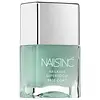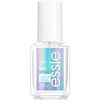What's inside
What's inside
 Key Ingredients
Key Ingredients

 Benefits
Benefits

 Concerns
Concerns

 Ingredients Side-by-side
Ingredients Side-by-side

Butyl Acetate
MaskingEthyl Acetate
PerfumingNitrocellulose
Acetyl Tributyl Citrate
MaskingAdipic Acid
BufferingMaleic Anhydride
Vp/Va Copolymer
Isopropyl Alcohol
SolventStearalkonium Bentonite
Gel FormingAcrylates Copolymer
Styrene/Acrylates Copolymer
Benzophenone-1
UV AbsorberCaprylic/Capric Triglyceride
MaskingTrimethylpentanediyl Dibenzoate
Hexanal
MaskingPunica Granatum Seed Oil
EmollientPolyvinyl Butyral
Isopropyl Myristate
EmollientHelianthus Annuus Seed
Skin ConditioningHelianthus Annuus Seed Oil
EmollientGlycerin
HumectantPropylene Glycol
HumectantWater
Skin ConditioningPistacia Lentiscus Gum Oil
AntimicrobialLauraldehyde
MaskingTocopheryl Acetate
AntioxidantGlyceryl Linoleate
EmollientVitis Vinifera Fruit Extract
Skin ConditioningCalcium Pantothenate
Zinc Acetylmethionate
Skin ConditioningCitrus Limon Peel
MaskingGlyceryl Linolenate
EmollientRetinyl Palmitate
Skin ConditioningLactobacillus/Brassica Oleracea Acephala Leaf Ferment Filtrate
EmollientPanax Ginseng Root Extract
EmollientMagnesium Ascorbyl Phosphate
AntioxidantCI 77510
Cosmetic ColorantAloe Barbadensis Leaf Extract
EmollientCI 19140
Cosmetic ColorantBiotin
AntiseborrhoeicTocopherol
AntioxidantSodium Benzoate
MaskingGlycine Soja Oil
EmollientButyl Acetate, Ethyl Acetate, Nitrocellulose, Acetyl Tributyl Citrate, Adipic Acid, Maleic Anhydride, Vp/Va Copolymer, Isopropyl Alcohol, Stearalkonium Bentonite, Acrylates Copolymer, Styrene/Acrylates Copolymer, Benzophenone-1, Caprylic/Capric Triglyceride, Trimethylpentanediyl Dibenzoate, Hexanal, Punica Granatum Seed Oil, Polyvinyl Butyral, Isopropyl Myristate, Helianthus Annuus Seed, Helianthus Annuus Seed Oil, Glycerin, Propylene Glycol, Water, Pistacia Lentiscus Gum Oil, Lauraldehyde, Tocopheryl Acetate, Glyceryl Linoleate, Vitis Vinifera Fruit Extract, Calcium Pantothenate, Zinc Acetylmethionate, Citrus Limon Peel, Glyceryl Linolenate, Retinyl Palmitate, Lactobacillus/Brassica Oleracea Acephala Leaf Ferment Filtrate, Panax Ginseng Root Extract, Magnesium Ascorbyl Phosphate, CI 77510, Aloe Barbadensis Leaf Extract, CI 19140, Biotin, Tocopherol, Sodium Benzoate, Glycine Soja Oil
Ethyl Acetate
PerfumingButyl Acetate
MaskingNitrocellulose
Propyl Acetate
PerfumingTributyl Citrate
SolventIsopropyl Alcohol
SolventTosylamide/Epoxy Resin
Adipic Acid/Neopentyl Glycol/Trimellitic Anhydride Copolymer
Stearalkonium Hectorite
Gel FormingAcrylates Copolymer
Benzophenone-1
UV AbsorberDimethyl Sulfone
SolventCalcium Sodium Borosilicate
Synthetic Fluorphlogopite
Hydrogenated Acetophenone/Oxymethylene Copolymer
Dimethicone
EmollientCitric Acid
BufferingOxidized Polyethylene
Acetyl Tributyl Citrate
MaskingCI 77120
Cosmetic ColorantAlumina
AbrasiveCalcium Aluminum Borosilicate
Colophonium
Silica
AbrasiveWater
Skin ConditioningTin Oxide
AbrasiveMagnesium Silicate
AbsorbentCalcium Pantothenate
Camellia Sinensis Leaf Extract
AntimicrobialAluminum Hydroxide
EmollientPhthalic Anhydride/Glycerin/Glycidyl Decanoate Copolymer
Acetone
SolventCI 77002
Cosmetic ColorantCI 77891
Cosmetic ColorantMica
Cosmetic ColorantCI 77491
Cosmetic ColorantCI 77499
Cosmetic ColorantCI 15880
Cosmetic ColorantCI 19140
Cosmetic ColorantCI 15850
Cosmetic ColorantCI 77400
Cosmetic ColorantCI 77288
Cosmetic ColorantCI 42090
Cosmetic ColorantCI 77510
Cosmetic ColorantCI 77000
Cosmetic ColorantCI 77163
Cosmetic ColorantCI 77266
Cosmetic ColorantEthyl Acetate, Butyl Acetate, Nitrocellulose, Propyl Acetate, Tributyl Citrate, Isopropyl Alcohol, Tosylamide/Epoxy Resin, Adipic Acid/Neopentyl Glycol/Trimellitic Anhydride Copolymer, Stearalkonium Hectorite, Acrylates Copolymer, Benzophenone-1, Dimethyl Sulfone, Calcium Sodium Borosilicate, Synthetic Fluorphlogopite, Hydrogenated Acetophenone/Oxymethylene Copolymer, Dimethicone, Citric Acid, Oxidized Polyethylene, Acetyl Tributyl Citrate, CI 77120, Alumina, Calcium Aluminum Borosilicate, Colophonium, Silica, Water, Tin Oxide, Magnesium Silicate, Calcium Pantothenate, Camellia Sinensis Leaf Extract, Aluminum Hydroxide, Phthalic Anhydride/Glycerin/Glycidyl Decanoate Copolymer, Acetone, CI 77002, CI 77891, Mica, CI 77491, CI 77499, CI 15880, CI 19140, CI 15850, CI 77400, CI 77288, CI 42090, CI 77510, CI 77000, CI 77163, CI 77266
Ingredients Explained
These ingredients are found in both products.
Ingredients higher up in an ingredient list are typically present in a larger amount.
Acetyl Tributyl Citrate is a fragrance.
Acrylates Copolymer is used as a film-forming agent and texture enhancer.
After applied, Acrylates Copolymer forms a thin film cover that helps skin feel more soft. It can help sunscreens become more water-resistant.
It is also used to make a product more thick.
Learn more about Acrylates CopolymerBenzophenone-1 absorbs UV.
We don't have a description for Butyl Acetate yet.
Calcium Pantothenate is calcium salt from Vitamin B5. It can be naturally found in plants and animals.
Calcium Pantothenate is a potent antioxidant. Antioxidants help fight free-radical molecules. Free-radical molecules are capable of damaging our cells and other genetic material. Antioxidants help stabilize free-radicals by donating extra electrons. This may help reduce the signs of aging.
Our bodies use Calcium Pantothenate for various metabolic functinos. These functions include metabolizing carbohydrates, proteins, and fatty acids.
Learn more about Calcium PantothenateCI 19140 is also known as Tartrazine. Tartrazine is a synthetic dye used in cosmetics, foods, and medicine to add a yellow color.
Tartrazine is created from petroleum and is water-soluble.
Some people may experience allergies from this dye, especially asthmatics and those with an aspirin intolerance.
Learn more about CI 19140This ingredient is used to impart a blue color. It is not water-soluble.
It goes by two different names:
1. Ferric Ferrocyanide: a synthetic dark blue pigment
2. Ferric Ammonium Ferrocyanide: a synthetic blue pigment, also called Prussian blue
In the EU, both of these colors must be labeled as 'CI 77510'.
Learn more about CI 77510Ethyl Acetate is a fragrance.
Isopropyl Alcohol is more commonly known as rubbing alcohol. It is most commonly used as a solvent, meaning it helps other ingredients dissolve.
This ingredient is an astringent alcohol. Astringent alcohols may also irritate skin as they high amounts may strip away your skin's natural oils.
Other types of astringent alcohols include:
According to the National Rosacea Society based in the US, you should be mindful of products with these alcohols in the top half of ingredients.
Any type of sanitizing product will have high amounts of alcohol to help kill bacteria and viruses.
Learn more about Isopropyl AlcoholWe don't have a description for Nitrocellulose yet.
Water. It's the most common cosmetic ingredient of all. You'll usually see it at the top of ingredient lists, meaning that it makes up the largest part of the product.
So why is it so popular? Water most often acts as a solvent - this means that it helps dissolve other ingredients into the formulation.
You'll also recognize water as that liquid we all need to stay alive. If you see this, drink a glass of water. Stay hydrated!
Learn more about Water